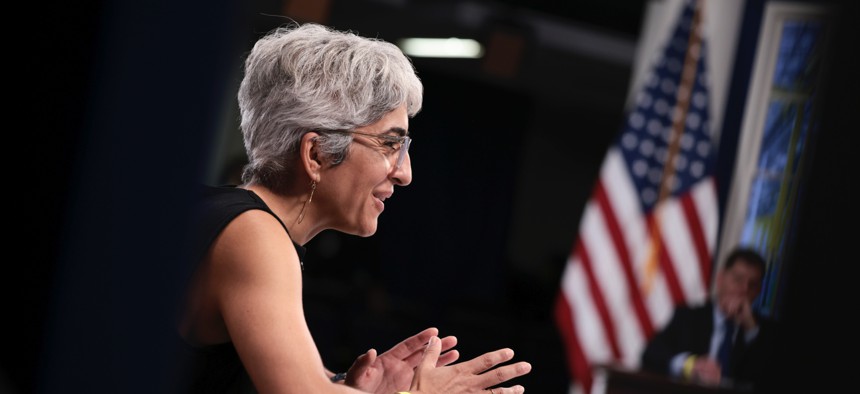
OPM Director Kiran Ahuja outlined updates to regulations that govern when agencies can ask job applicants about their possible criminal histories. Anna Moneymaker / GETTY IMAGES
OPM guidance details when agencies can ask about applicants' criminal history
Though the federal government had already implemented a form of “ban the box” administratively, the Fair Chance to Compete for Jobs Act necessitated an update of the policy.
The Office of Personnel Management announced Thursday that it is making a couple of tweaks to the federal government’s “ban the box” policy barring agencies from asking job applicants about their criminal history until the end of the hiring process.
The Obama administration first instituted a policy barring federal agencies from asking most job seekers if they have a criminal history until the conditional offer phase of the hiring process administratively in 2016. But in 2019, President Trump signed the Fair Chance to Compete Act into law, which codified the policy as well as expanding it to apply to federal contractors. OPM issued regulations implementing the measure last fall.
In a memo to agency heads Thursday, OPM Director Kiran Ahuja offered guidance on how those new regulations should work in practice. First, she reiterated that exemptions to the ban exist for positions that require agencies to ask about potential criminal histories prior to extending a job offer: jobs that require a security clearance, positions deemed “sensitive” by OPM and the director of national intelligence, law enforcement jobs and dual-status military technicians.
But under the law, agencies can no longer request exemptions for positions that fall outside of those criteria. Positions already granted an exemption by OPM may continue to ask applicants if they have a criminal history prior to offering them a conditional job offer, however.
“Exceptions previously granted by OPM will remain valid for the position (title, series and grade) for which they were approved,” the agency wrote in an FAQ. “With the approved exception, agencies are permitted to collect criminal history from applicants for the position ahead of [a] conditional offer, at the point specified in the agency’s request, so long as the job-related need for which the request was made continues to exist.”
Ahuja reminded agencies that they cannot solicit information about a job applicant’s criminal history either in written or oral form, and they are required to publicize the ban in their job announcements, as well as direct applicants on how to file complaints about potential violations of the rule, another new provision included in the 2019 law. And if a job applicant volunteers information about their criminal history, hiring managers should put those details aside until they are authorized to consider it.
“For positions subject to the requirement of the Fair Chance Act, if an applicant provides criminal history information prior to [a] conditional job offer, an agency should consider the intent of the Fair Chance Act, which is to better ensure that applicants from all segments of society, including those with prior criminal histories, receive a fair opportunity to compete for federal employment,” OPM wrote. “[Agency] qualification or hiring decisions should not take into account an individual’s criminal history, unless specifically authorized to collect the criminal history information prior to [a] conditional job offer.”
Ahuja urged agencies to develop and distribute their policies for handling criminal history information during the hiring process to ensure all employees adhere to the new regulations.
“Agencies must establish and publish well-documented procedures for meeting this requirement and share them widely with human resources or security personnel in roles that may cause them to engage with applicants during the pre-offer stage,” Ahuja wrote. “Agencies should educate their workforce and contractors about their responsibilities under the act. This will help prevent employees from violating provisions of the act, which would violate the applicant’s rights and potentially subject the employee to a complaint, and, if founded, adverse action.”







